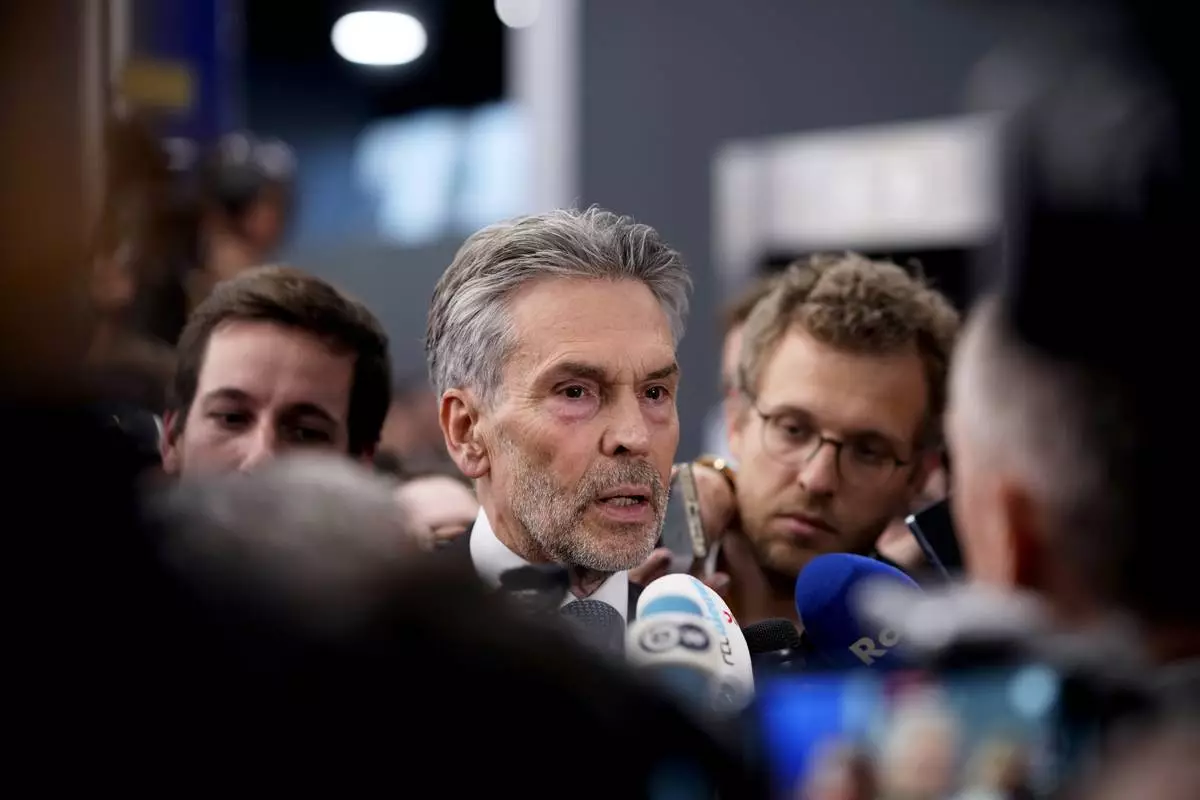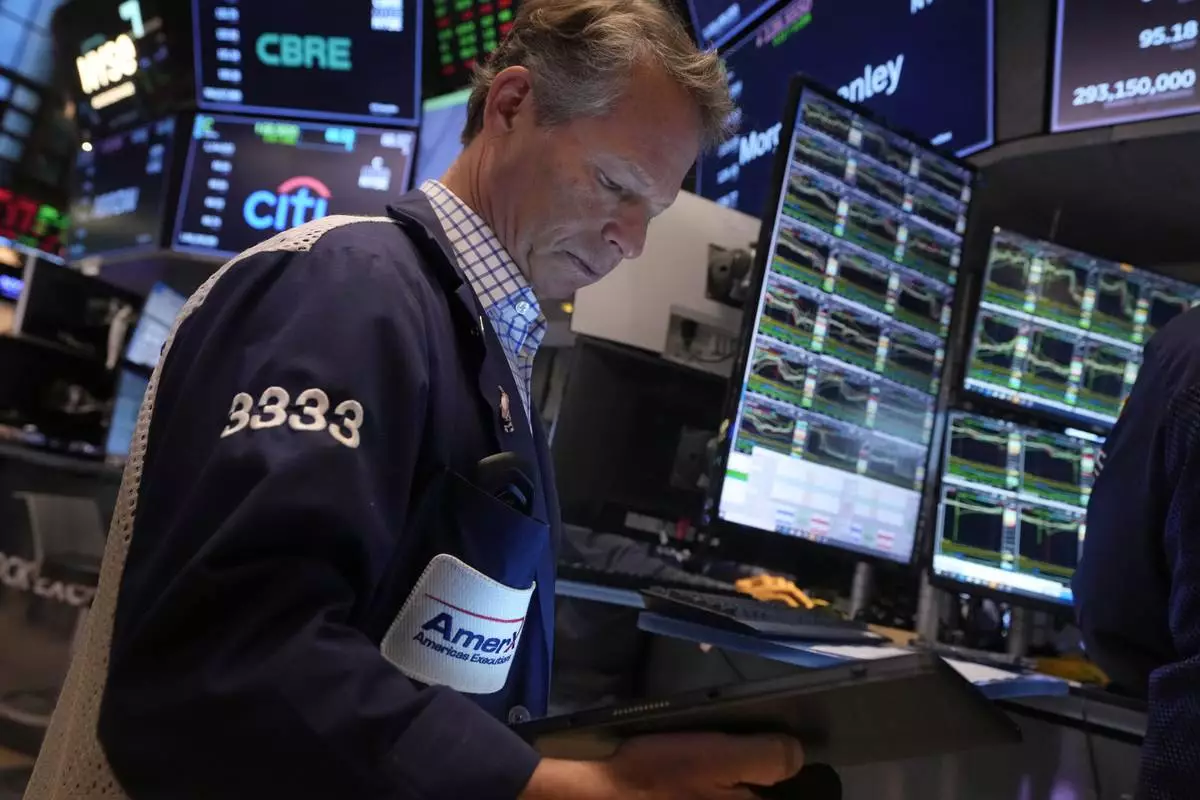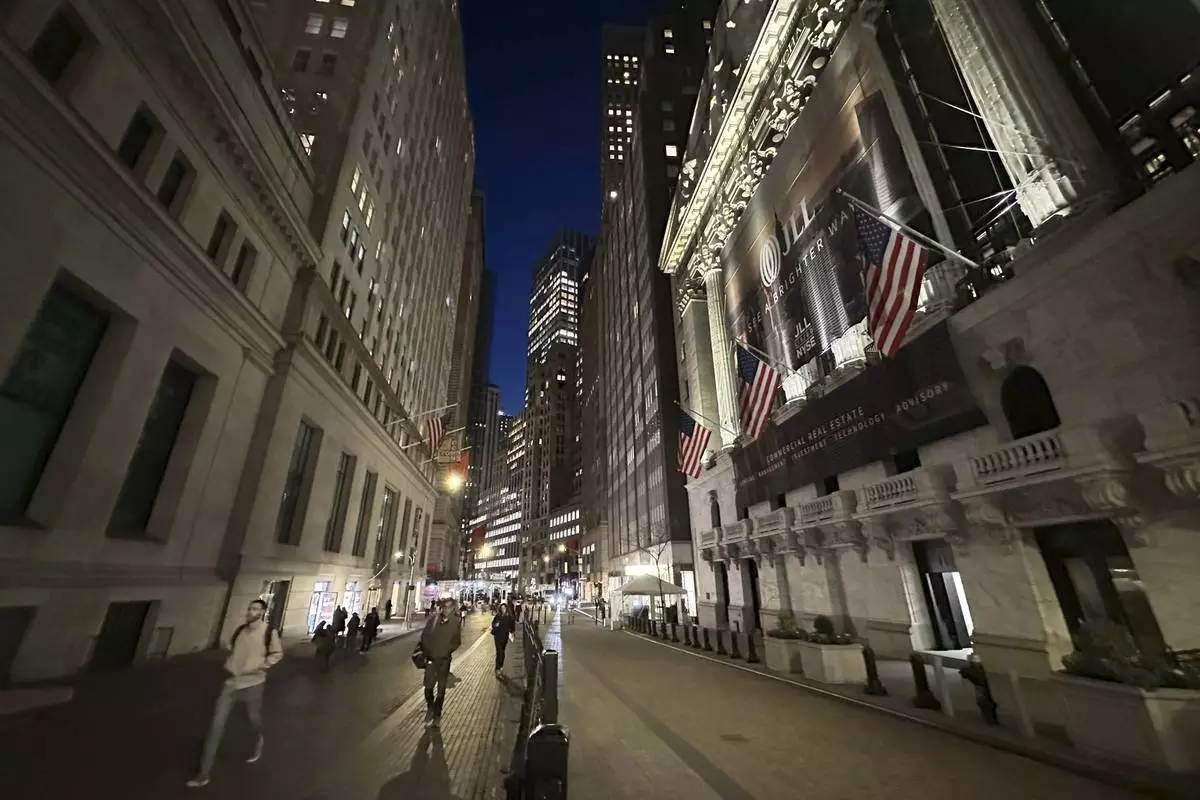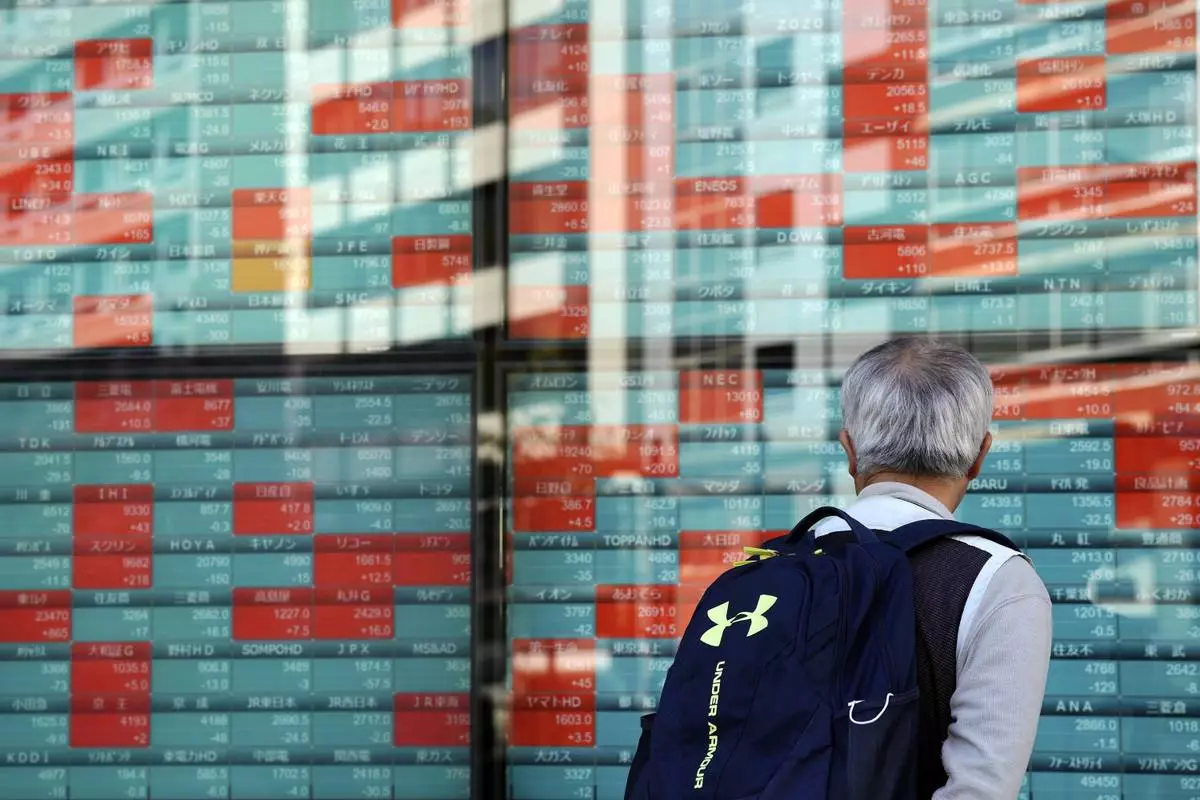THE HAGUE, Netherlands (AP) — The leaders of coalition parties in the Dutch government dominated by hard-right leader Geert Wilders gathered Friday for crisis talks following reports that the finance state secretary was resigning over what she saw as denigrating comments on immigrants after Israeli fans were assaulted after a soccer game in Amsterdam.
Wilders last Wednesday blamed Moroccans for attacks on Israeli soccer fans, claiming that “we saw Muslims hunting Jews” and added it was fueled by ”Moroccans who want to destroy Jews.” He said those convicted of involvement should be deported if they have dual nationality.
Dutch media said that Morocco-born Nora Achahbar of centrist New Social Contract party would announce her resignation as finance secretary later Friday. The news couldn't immediately be independently confirmed.
While lawmakers condemned antisemitism and agreed that perpetrators of the violence should be prosecuted and handed harsh punishments, opposition legislators accused Wilders of pouring oil on the fire. Wilders, whose party became the biggest in last year's election, also sowed some dissent within the four-party coalition with his comments.
Late Friday, video and photos appeared of party leaders arriving at the Catshuis residence of Prime Minister Dick Schoof.
The leader of the Green-left-Socialist opposition, Frans Timmermans, lauded Achahbar even before any move was announced.
“In this government, racist remarks are the order of the day. This government is not for all Dutch people,” he said.
Violence erupted in the Dutch capital before and after last week’s soccer match between Ajax Amsterdam and Maccabi Tel Aviv.
Fans from both sides were involved in unrest. A number of Maccabi fans chanted anti-Arab slogans and ripped a Palestinian flag off a building, while some men carried out “hit-and-run” attacks on Maccabi fans and people they thought were Jews, according to a 12-page report on the violence issued by Amsterdam authorities.

Secretary Tjebbe Oostenbruggen of the NSC party arrives at the Catshuis residence of Dutch prime minister Dick Schoof in The Hague, Netherlands, Friday Nov. 15, 2024, for crisis talks after the government's controversial assessment of last week's violence before and after the soccer match between Ajax Amsterdam and Maccabi Tel Aviv. (AP Photo/Phil Nijhuis)

The resigned secretary Nora Achahbar of the NSC party in the Catshuis residence of Dutch prime minister Dick Schoof in The Hague, Netherlands, Friday Nov. 15, 2024, for crisis talks after the government's controversial assessment of last week's violence before and after the soccer match between Ajax Amsterdam and Maccabi Tel Aviv. (AP Photo/Phil Nijhuis)

Nicolien van Vroonhoven of the NSC party in the Catshuis residence of Dutch prime minister Dick Schoof in The Hague, Netherlands, Friday Nov. 15, 2024, for crisis talks after the government's controversial assessment of last week's violence before and after the soccer match between Ajax Amsterdam and Maccabi Tel Aviv. (AP Photo/Phil Nijhuis)

Netherland's Prime Minister Dick Schoof, center, speaks with journalists during an EU Summit at the Puskas Arena in Budapest, Hungary, Friday, Nov. 8, 2024. (AP Photo/Petr David Josek)
NEW YORK (AP) — U.S. stocks fell to their worst loss since Election Day as the rally that Wall Street got from last week’s victory for Donald Trump and a cut to interest rates by the Federal Reserve kept fading. The S&P 500 sank 1.3% Friday to close a losing week. The Dow Jones Industrial Average dropped 0.7%, and the Nasdaq composite fell 2.2%. Moderna and other makers of vaccines helped drag the market down after President-elect Donald Trump named Robert F. Kennedy Jr., an anti-vaccine activist, to be his health secretary. Treasury yields swung following stronger-than-expected reports on the economy.
THIS IS A BREAKING NEWS UPDATE. AP’s earlier story follows below.
NEW YORK (AP) — U.S. stocks are falling Friday toward their worst loss since Election Day as the big bump Wall Street got from last week's victory for Donald Trump and cut to interest rates by the Federal Reserve keeps fading.
The S&P 500 sank 1.4% and was heading for a losing week and its worst day since October. The Dow Jones Industrial Average was down 310 points, or 0.7%, as of 2:44 p.m. Eastern time, and the Nasdaq composite was 2.4% lower.
Makers of vaccines helped drag the market down after President-elect Donald Trump said he wants Robert F. Kennedy Jr., a prominent anti-vaccine activist, to be his Secretary of Health and Human Services. Moderna tumbled 6.2%, and Pfizer fell 4.8% amid concerns about a possible hit to profits.
Kennedy still needs confirmation from the Senate to get the job, and some analysts are skeptical about his chances because of his views on vaccines and criticism of the pharmaceutical industry.
“However, if Kennedy is confirmed, it is hard to bookend risks for investors as his views are so outside the traditional Republican health policy orthodoxy,” Raymond James analyst Chris Meekins wrote in a research note. Meekins is a former deputy assistant secretary at the department known as HHS.
“Investors may need to forget everything they thought they knew about Republicans and healthcare," he said. "Kennedy’s appointment may make it less likely traditional qualified experienced (Republican) staff will agree to join HHS, creating more uncertainty.”
The only stock in the S&P 500 to fall more than Moderna was Applied Materials, which dropped 8.6% even though it reported a stronger profit for the latest quarter than analysts expected. The provider of manufacturing equipment and services to the semiconductor industry gave a forecasted range for upcoming revenue whose midpoint was short of analysts’ expectations.
The pressure is on companies to deliver big growth, in part because their stock prices have been rising so much faster than their earnings. That’s made the broad stock market look more expensive by a range of measures, which has critics calling for at least a fade. The S&P 500 is still up about 23% for the year and near its all-time high set a few days ago, despite this week’s weakness.
Stocks had been broadly roaring since Election Day, when Trump’s victory sent a jolt through financial markets worldwide. Investors immediately began sending up stocks of banks, smaller U.S. companies and cryptocurrencies as they laid bets on the winners coming out of Trump’s preference for higher tariffs, lower tax rates and lighter regulation.
But investors are also taking into account some of the potential downsides from Trump’s return to the White House.
Besides Friday’s hit to vaccine makers, Treasury yields have also been climbing in the bond market on both the economy’s surprising resilience and worries that Trump’s policies could spur bigger U.S. government deficits and faster inflation.
That's forced traders to recalibrate how much relief the Federal Reserve could provide for the economy next year through cuts to interest rates. The Fed earlier this month lowered its main interest rate for the second time this year, and past forecasts published by Fed officials indicated more cuts were likely to come through 2025.
Lower interest rates can act as fuel for the economy and stock market, particularly after the Fed had kept rates at a two-decade high, but they can also put upward pressure on inflation.
On Thursday, Fed Chair Jerome Powell suggested the U.S. central bank will be cautious about future decisions on interest rates. “The economy is not sending any signals that we need to be in a hurry to lower rates,” he said, though he declined to discuss how Trump’s policies could alter things.
Traders have since ratcheted back forecasts for whether the Fed will cut rates again at its meeting next month, but they still see better than a coin flip’s chance of it, according to data from CME Group.
On Friday, Treasury yields were mixed in the bond market following several reports on the economy.
One showed shoppers spent more at U.S. retailers last month than expected, another signal that the most influential force on the economy remains solid.
“Many consumers were reporting that they were putting off trips and big ticket item purchases until after the election,” according to Brian Jacobsen, chief economist at Annex Wealth Management. “Many businesses reported they were putting off capital investment due to the election. Now that the uncertainty of the outcome is behind us, we could see some decent ‘relief spending.’”
Friday’s data on retail sales, though, may not be quite as strong as it appeared. After taking away purchases of automobiles, sales at retailers were weaker last month than economists expected.
A separate report, meanwhile, showed manufacturing activity in New York state is growing strongly. That soundly beat expectations for zero growth, and it comes off October’s contraction. Some of the survey’s responses were collected after Election Day.
In the bond market, the 10-year Treasury yield slid to 4.42% from 4.44% late Thursday. The two-year yield, which more closely tracks expectations for Fed action, slipped to 4.29% from 4.36% late Thursday.
In stock markets abroad, London’s FTSE 100 fell 0.1% after data from the Office for National Statistics showed economic growth slowed to 0.1% in the July-September quarter from the 0.5% in the previous quarter. It was weaker than expected.
Tokyo’s Nikkei 225 gained 0.3% after data showed growth for Japan’s economy accelerated in the latest quarter, even as the Bank of Japan raised interest rates in July.
AP Writers Matt Ott and Zimo Zhong contributed.

Trader Robert Charmak works on the floor of the New York Stock Exchange, Friday, Nov. 8, 2024. (AP Photo/Richard Drew)

People pass the New York Stock Exchange, right, on Wednesday, Nov. 13, 2024, in New York. (AP Photo/Peter Morgan)

FILE - Currency traders work at the foreign exchange dealing room of the KEB Hana Bank headquarters in Seoul, South Korea, Tuesday, Nov. 12, 2024. (AP Photo/Ahn Young-joon, File)

FILE - A person looks at an electronic stock board showing Japan's Nikkei index at a securities firm Wednesday, Nov. 13, 2024, in Tokyo. (AP Photo/Eugene Hoshiko, File)

















